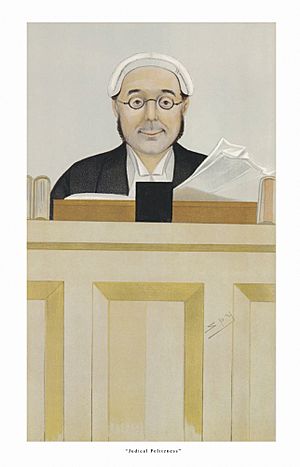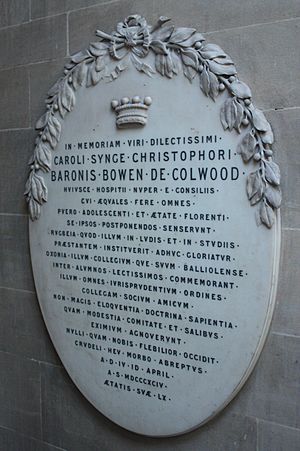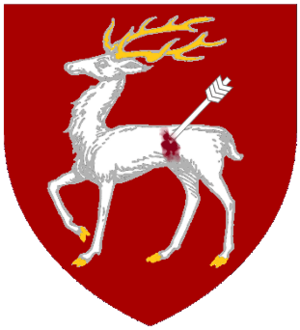Charles Bowen, Baron Bowen facts for kids
Quick facts for kids
The Lord Bowen
|
|
|---|---|

"Judicial Politeness", Bowen as caricatured by Spy (Leslie Ward) in Vanity Fair, March 1892
|
|
| Lord of Appeal in Ordinary | |
| In office 23 September 1893 – 10 April 1894 |
|
| Preceded by | The Lord Hannen |
| Succeeded by | The Lord Russell of Killowen |
| Lord Justice of Appeal | |
| In office 2 June 1882 – 23 September 1893 |
|
| Preceded by | Sir John Holker |
| Succeeded by | Sir Horace Davey |
| Justice of the High Court | |
| In office 16 June 1879 – 2 June 1882 |
|
| Preceded by | Sir John Mellor |
| Succeeded by | Sir John Day |
| Personal details | |
| Born |
Charles Synge Christopher Bowen
1 January 1835 Woolaston, Gloucestershire, England |
| Died | 10 April 1894 (aged 59) Knightsbridge, London |
| Alma mater | Balliol College, Oxford |

Charles Synge Christopher Bowen, Baron Bowen (born January 1, 1835 – died April 10, 1894) was an important English judge. He was known for his sharp mind and polite manner. He held several high positions in the legal system during his career.
Contents
Early Life and Education
Charles Bowen was born in Woolaston, Gloucestershire, England. His father was a reverend, and his younger brother, Edward Ernest Bowen, became a well-known schoolmaster.
Charles went to school in France, then at Blackheath Proprietary School and Rugby School in England. He was a very bright student. In 1853, he won a special scholarship to attend Balliol College, Oxford. At Oxford, he continued to excel, winning many top awards for his studies. He became a "fellow" of Balliol College in 1857, which meant he was a senior member of the college. He also became the President of the Oxford Union in 1857. The Oxford Union is a famous debating society for students.
While he was President-Elect of the Oxford Union, Charles Bowen helped make a special art project happen. Artists like Dante Gabriel Rossetti and William Morris wanted to paint scenes from the King Arthur legends on the walls of the new debating hall. Charles Bowen's support was key to getting this project started. People who knew him said he was "beloved by all" and a "courteous and delightful fellow."
A Career in Law
After finishing his studies at Oxford, Charles Bowen moved to London. In 1861, he became a barrister at Lincoln's Inn. This meant he was qualified to argue cases in court. While studying law, he also wrote articles for popular newspapers like the Saturday Review and The Spectator.
He even played a single first-class cricket match for Hampshire in 1861. His brother, Edward, also played first-class cricket.
At first, Charles didn't have much success as a barrister. He even thought about becoming a college tutor instead. But his friends encouraged him to keep trying. Soon, his hard work paid off. He worked on a very famous case called the Tichborne Case. His help in this case led him to become a junior lawyer for the Treasury, which is a government legal role. After this, he became very busy with many cases.
The long and difficult Tichborne trials took a toll on his health. In 1879, he accepted a position as a High Court judge in the Queen's Bench division. This role offered him a bit more rest. He was also made a knight that year, so he was known as Sir Charles Bowen.
In 1882, he was promoted to the Court of Appeal as a Lord Justice of Appeal. In this role, he was known for his deep knowledge of the law, his hard work, and his kindness to everyone in court. Even though his health was getting worse, he worked regularly until August 1893.
Then, he was given an even higher position: a Lord of Appeal in Ordinary. This meant he became a "life peer" with the title Baron Bowen. A life peer is someone who gets a special title for their lifetime, allowing them to sit in the House of Lords, but the title does not pass to their children.
Sadly, by this time, his health had completely failed. He never actually sat as a law lord to hear appeals. His last public duty was leading a group that looked into the Featherstone riots in October 1893.
Lord Bowen was well-liked by everyone who knew him. He had a very clever and polite sense of humor. For example, when judges were preparing an address to Queen Victoria, someone suggested a line, "conscious as we are of our shortcomings," sounded too humble. Lord Bowen jokingly suggested changing it to "conscious as we are of one another's shortcomings." Another time, he defined a "jurist" (a legal expert) as "a person who knows a little about the laws of every country except his own."
Charles Bowen's reputation as a judge comes from his clear and smart decisions in the Court of Appeal. These decisions helped explain legal rules in a way that made sense for real-life situations.
Literary Works and Famous Quotes
Besides his legal work, Lord Bowen also enjoyed writing. He translated parts of the famous Roman poet Virgil's works, including Eclogues and the first six books of the Aeneid. He also wrote a pamphlet about a legal dispute called The Alabama Claim and Arbitration.
He is remembered for some clever quotes, including this humorous poem:
The rain it raineth on the just
And also on the unjust fella;
But chiefly on the just, because
The unjust hath the just’s umbrella.
Another famous quote shows his sharp legal mind:
When I hear of an 'equity' in a case like this, I am reminded of a blind man in a dark room - looking for a black hat - which isn't there.
He is also credited with coining the phrase "the man on the Clapham omnibus." This phrase is used in law to describe the average, reasonable person.
Family Life
In 1862, Charles Bowen married Emily Frances. She was the eldest daughter of a famous engineer named James Meadows Rendel. Charles and Emily had two sons and one daughter. Their daughter, Ethel Kate Bowen, married Josiah Wedgwood IV, who later became the 1st Baron Wedgwood of the famous pottery family.
Notable Legal Cases
Lord Bowen was involved in many important legal cases. Here are a few examples of cases where his judgments were significant:
- Hutton v West Cork Rly Co - This case looked at when company directors can spend company money for people who are not shareholders.
- Smith v Land and House Property Corp - This case helped define what counts as a "misrepresentation" in a contract. It showed that even an opinion can be a misrepresentation if it implies certain facts.
- Edgington v Fitzmaurice - In this case, Lord Bowen famously said, "the state of a man's mind is as much a fact as the state of his digestion." This was about false statements of intention.
- The Moorcock - This case helped create the "Business Efficacy" Test. This test is used to decide if a term should be considered an unspoken part of a contract because it's necessary for the contract to work.
- Carlill v Carbolic Smoke Ball Company - This very famous case decided that an advertisement offering a reward could be a binding offer. Anyone who performed the actions in the ad could accept the offer.
- Mogul Steamship Co Ltd v McGregor, Gow & Co - This case dealt with whether a group of companies could be sued for working together to harm another company's business.
 | Bessie Coleman |
 | Spann Watson |
 | Jill E. Brown |
 | Sherman W. White |


